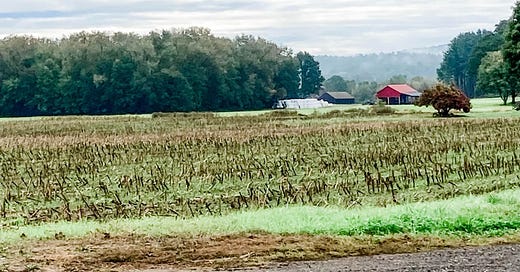Why Lumberjacks, Foresters, and Farmers Are Happier Than Lawyers
The Underrated Benefits of Spending Time in Nature
An analysis published a couple of years ago in The Washington Post examined data from the Bureau of Labor Statistics’ American Time Use Survey to compare rates of happiness across people in different professions. This analysis of America’s most — and least — happy workers revealed fascinating findings.
Who are the least happy workers? Lawyers. (And as one married to a lawyer, this was not a particularly unexpected finding.)
Who are the most? These results I found much more surprising: lumberjacks, foresters, and farmers.
These three occupations share one key feature that is rather obvious: these are jobs that involve working outside. And these jobs don’t simply involve being outside — instead, they involve being outside in nature (as opposed to say, a construction worker building a skyscraper or an interstate highway).
These findings help explain why many companies spend vast sums to bring nature into the workplace, from the meeting rooms with vine-covered walls in Amazon’s Seattle headquarters to the forest of trees on Apple’s campus in Cupertino, California.
What’s so good about spending time in nature? Here’s what empirical research reveals (and why I really love the drive pictured below on my commute to work).
Spending time in nature is relaxing for your body - and for your brain. Exposure to nature basically switches the body from a state of high physiological arousal to one of rest and relaxation. This finding explains why people who regularly take walks in so-called green spaces—forests or parks—report feeling better able to cope with stress.
This type of short-term exposure to nature also helps reduce the physiological toll of stress. For example, research from Japan on shinrin-yoku (“forest bathing,” meaning spending time in a forest area) shows simply walking in a forest for twenty or so minutes leads to lower levels of blood pressure, heart rate, and the stress hormone cortisol compared to walking in an urban area.
Fascinating research in neuroscience reveals that spending time in nature also decreases activity in parts of the brain that process stress.
Participants in one study wore caps containing electrodes so that researchers could assess brain activity. The researchers then compared how the brain responded to different types of environments. As predicted, people walking in a parklike setting showed calmer brain waves, including lower levels of arousal and frustration, than people walking in urban area
These findings explain why people who spend time in nature experience better overall physical well-being and lower levels of chronic illness, including diabetes, hypertension, and lipid disorders. In fact, some evidence suggests that visits to outdoor green spaces of thirty minutes or more each week could reduce the prevalence of hypertension — a major contributor to other chronic disorders — by as much as 9 percent.
The takeaway from this research is pretty clear: find ways to regularly spend time in nature, whether that’s tending to a flower or vegetable garden in your yard, strolling through a city park on your lunch hour, going for a hike in a forest on the weekends.
Now a couple of questions for you: Do you regularly spend time in nature? And if so, what’s your favorite place? Please share in the comments!





I enjoy any place with water. Forests with creeks, rivers, the beach etc.
I enjoy the sounds of moving water as well as the flora and fauna that surround it.
I always like a potential to see foraging animals, a rock, plant, or tree i have never seen before.
Lastly, like looking up the stars in the night sky, it reminds me that I am just a small animal roaming around the planet and much of what i worry about simply does not matter.
So perspective and connection with the earth it was it does for me. ☺️
I am very fortunate to live within easy walking distance to the Monterey Bay and areas of the Del Monte forest. I walk daily for chats with my husband, to relieve stress and to take time to stop and smell the roses or in my case appreciate my surroundings. It really can be restorative to walk in nature.